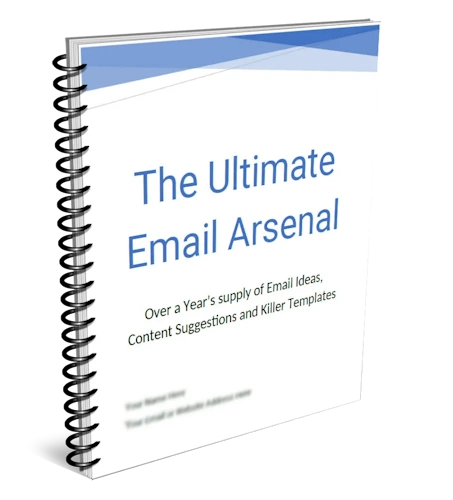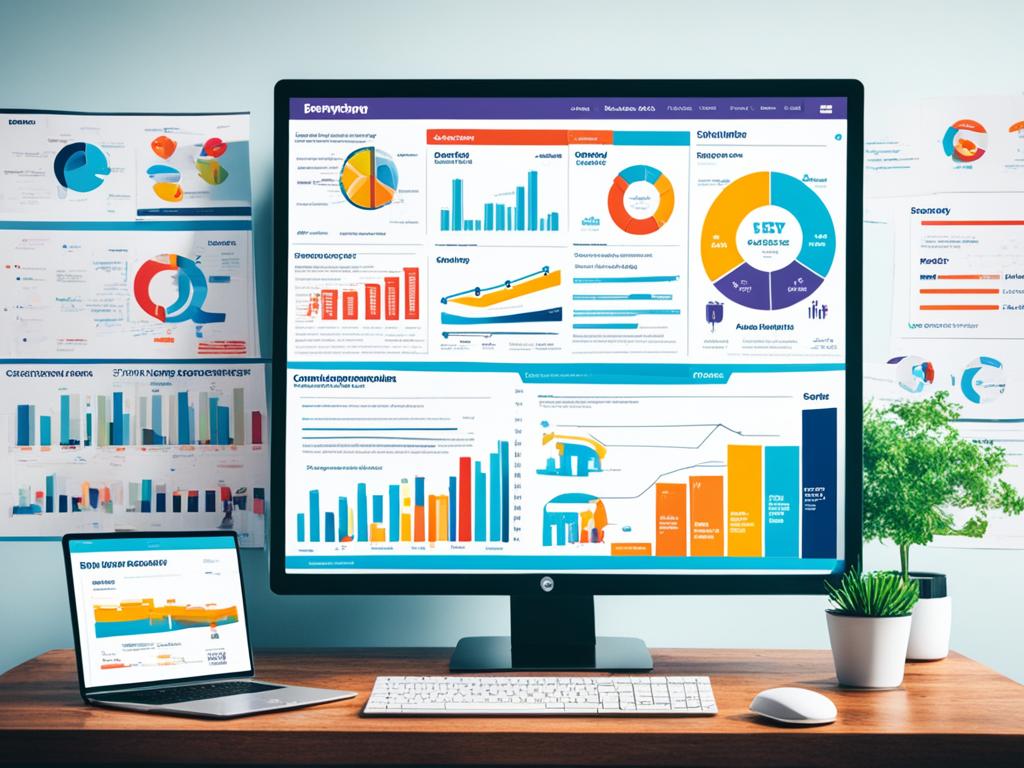Are you tired of investing in online advertising campaigns that don’t deliver the desired results? Do you want to make the most out of your pay-per-click (PPC) campaigns and achieve a higher return on investment (ROI)?
Effective PPC campaigns can be a game-changer for businesses, providing them with a cost-effective way to reach their target audience and drive traffic to their websites. But how can you ensure that your PPC campaigns are successful and maximize your ROI?
In this article, I will share powerful strategies that will help you optimize your PPC campaigns and achieve outstanding results. From keyword targeting to ad copy optimization, tracking, and retargeting, you’ll discover the key ingredients for a successful PPC campaign that delivers tangible results.
Key Takeaways:
- Set clear goals for your PPC campaign to align your efforts and measure success.
- Identify the right keywords for your target audience and optimize your ad copy for better visibility.
- Track the performance of your campaign using tools like Google Analytics to make data-driven decisions.
- Implement retargeting campaigns to reach potential customers who have shown interest in your ads.
- Benefit from increased website traffic, brand recognition, and lead generation with a successful PPC campaign.
Determine Your Goals
Before starting your PPC campaign, it’s important to determine your goals. What do you want to achieve with your campaign? Whether it’s increasing brand awareness, driving traffic to your website, or generating more sales, knowing your goals will help you develop a focused PPC strategy.
Setting clear goals for your PPC campaign is crucial for several reasons. First, it helps you establish a benchmark for measuring success. By defining specific targets, such as increasing website traffic by 20% or generating $10,000 in sales, you give yourself something concrete to aim for.
Add emphasis: Setting clear goals for your PPC campaign is crucial for several reasons.
Second, having well-defined goals allows you to align your campaign with your overall business objectives. For example, if your primary goal is to increase brand awareness, you can allocate a larger portion of your budget towards display ads that reach a wider audience.
Furthermore, knowing your goals helps you prioritize your efforts and allocate resources effectively. If your main goal is to generate leads and drive sales, you can focus on targeting keywords with high commercial intent and optimizing your landing pages for conversion.
Add a quote:
„Having well-defined goals allows you to align your campaign with your overall business objectives.“
Lastly, setting goals helps you evaluate the success of your PPC campaign and make data-driven decisions. By tracking key metrics such as click-through rates, conversion rates, and return on ad spend, you can assess the effectiveness of your campaign and make necessary adjustments to improve performance.
| Benefits of Goal Setting in PPC Campaigns |
|---|
| Clear benchmark for measuring success |
| Alignment with overall business objectives |
| Effective allocation of resources |
| Data-driven decision making |
Add a heading:
Aligning Your Goals with PPC Strategies
Once you have determined your goals, you can align them with specific PPC strategies to achieve optimal results:
- Brand Awareness: Invest in display ads and social media campaigns to increase visibility and reach a wider audience.
- Website Traffic: Focus on targeting relevant keywords and optimizing your ads to drive qualified traffic to your website.
- Sales: Optimize your landing pages for conversion and target keywords with high commercial intent to generate leads and drive sales.
By setting clear goals and aligning them with appropriate PPC strategies, you can maximize the effectiveness of your campaigns and achieve your desired outcomes.
Identify the Right Keywords
Once you have set your goals, it’s crucial to identify the right keywords for your PPC campaign. Conducting thorough keyword research and utilizing tools like Google’s Keyword Planner can help you discover the most relevant keywords for your business. By choosing the right keywords, you can effectively target your desired audience and enhance the visibility of your PPC ads on search engines.
Keyword research is an indispensable part of any successful PPC campaign. It allows you to understand the language and phrases that your target audience uses when searching for products or services similar to yours. With this knowledge, you can strategically align your campaign with the interests and needs of potential customers.
The Google Keyword Planner is an efficient tool that provides valuable insights into search trends, competition, and suggested bid estimates for keywords. By analyzing this data, you can determine which keywords offer the best potential for driving meaningful traffic to your website.

Why Keyword Research is Essential
Keyword research helps in understanding the language and phrases potential customers use when searching for products or services similar to yours. By aligning your PPC campaign with these keywords, you can connect with your target audience effectively.
Effective keyword research can also help you uncover long-tail keywords – specific keyword phrases that may have lower search volumes but higher conversion rates. These long-tail keywords often demonstrate clearer intent and lower competition, making them valuable for driving qualified traffic and increasing conversion rates.
Additionally, keyword research can assist you in discovering new keyword opportunities based on emerging trends or changes in your industry. By staying ahead of the curve and adapting your PPC campaign to match evolving search behavior, you can maintain a competitive edge and continue attracting relevant traffic to your website.
Now that you have identified the right keywords for your PPC campaign, the next step is to expand on them. Section 4 will delve into the importance of ad copy and design in making your PPC ads compelling and visually appealing.
Expand on Those Keywords
Now that you have identified the right keywords for your PPC campaign, it’s time to take them to the next level. Expanding on your keywords involves creating ad copy that is compelling and eye-catching, as well as designing ads with a unique and captivating visual appeal.
Remember, your ad copy is the first impression that potential customers have of your business. It needs to grab their attention, pique their interest, and compel them to take action. By highlighting the unique selling propositions of your business in your ad copy, you can differentiate yourself from the competition and attract more clicks.
Additionally, designing visually appealing ads is essential for capturing the attention of your target audience. A well-designed ad can stand out amid the sea of competitors and increase the chances of attracting clicks. Incorporate eye-catching colors, engaging images, and clear call-to-action buttons to make your ads visually appealing and memorable.
To further enhance the effectiveness of your PPC ads, consider using unique keywords that are tailored to your specific target audience. These unique keywords can help you reach a more niche market and increase the relevance of your ads, resulting in higher click-through rates and more conversions.
By expanding on your keywords through compelling ad copy, eye-catching design, and unique keywords, you can maximize the impact of your PPC campaigns and gain a competitive edge in the online advertising landscape.
Prioritize Your Chosen Keywords
Once you’ve chosen the keywords for your PPC campaign, it’s time to prioritize them. By focusing on the most relevant and popular keywords, you can increase your chances of success and maximize your campaign’s ROI.
One of the best tools to help you prioritize your keywords is Google AdWords‘ Keyword Planner. This powerful tool allows you to analyze keyword search volume, competition, and trends, giving you valuable insights into which keywords are most likely to generate the desired results.
When prioritizing your keywords, consider the following factors:
- Relevance: Choose keywords that closely align with your products or services. Targeting relevant keywords ensures that your ads will reach the right audience, increasing the likelihood of conversions.
- Popularity: Focus on keywords that have a high search volume. Popular keywords indicate a higher demand and can potentially bring more traffic to your website.
- Competition: Assess the level of competition for each keyword. Highly competitive keywords may be more difficult to rank for, while less competitive keywords can provide you with a competitive edge.
- Long-Tail Keywords: Consider incorporating long-tail keywords into your campaign. These longer and more specific keywords can attract highly targeted traffic and result in higher conversion rates.
By prioritizing your chosen keywords, you can allocate your resources effectively and optimize your PPC campaign for better results.
Determine the Desired Conversion Action
When running a PPC campaign, it is crucial to determine the desired conversion action. What specific action do you want users to take after clicking on your ads? Identifying this conversion action will guide your tracking and retargeting campaigns, allowing you to optimize and maximize the effectiveness of your campaign.
Whether you want users to sign up for a newsletter, make a purchase, download an ebook, or take any other action that aligns with your business goals, it’s essential to define it clearly. This conversion action will serve as the primary metric for measuring the success of your PPC campaign.
By clearly defining the desired action, you can track the conversion rates and identify areas for improvement in your campaign. This tracking will provide valuable insights into the effectiveness of your ads, keywords, and landing pages.
To track the desired conversion action, you can utilize various tools and platforms, such as Google Analytics. Setting up proper tracking enables you to measure and analyze the performance of your PPC campaign. It allows you to understand which aspects of your campaign are working well and which need optimization.
In addition to tracking, retargeting campaigns play a vital role in increasing conversions. They allow you to reach out to users who have previously interacted with your ads or website. By retargeting these individuals, you can remind them of your brand, offers, or products, increasing the likelihood of conversion.
The Importance of Tracking and Retargeting
Tracking and retargeting are instrumental in optimizing your PPC campaign and driving conversions. They provide valuable insights into user behavior and enable you to engage with potential customers who have expressed interest in your offerings.
Through effective tracking, you can gather data on user interactions, such as ad clicks, landing page visits, and conversion rates. This data empowers you to make informed decisions and fine-tune your campaign for better results.
Retargeting campaigns, on the other hand, keep your brand top-of-mind for users who have previously engaged with your ads or website. By displaying targeted ads to these individuals, you can nurture their interest and guide them back to your conversion funnel.
Implementing retargeting campaigns requires setting up audience segments based on user behavior and defining specific ad strategies to re-engage with those segments. With proper segmentation and personalized messaging, you can significantly improve the effectiveness of your retargeting efforts and drive higher conversion rates.
Tracking and Retargeting Campaigns: A Winning Combination
Combining tracking and retargeting campaigns creates a powerful synergy that drives conversions and maximizes the ROI of your PPC campaign. By tracking the desired conversion action and analyzing the data, you can identify patterns, optimize your ads and landing pages, and increase your overall conversion rate.
Retargeting campaigns then enable you to nurture the interest of potential customers who have already shown intent. By reminding them of your brand or promotions, you can increase engagement, trust, and ultimately, conversions.
Remember, the success of your PPC campaign lies not only in attracting clicks but also in guiding those clicks towards your desired action. Take the time to determine your desired conversion action, set up proper tracking, and implement retargeting campaigns to enhance your overall campaign performance.
Set Up Proper Tracking
Tracking is a critical component of monitoring and improving the performance of your PPC campaign. By setting up proper tracking using tools like Google Analytics, you gain valuable insights into the effectiveness of your ads and can make data-driven decisions to optimize your campaign.
Why Tracking Matters
Tracking allows you to measure campaign performance, understand user behavior, and identify areas of optimization. With accurate data, you can determine which keywords, ad copy, and landing pages are driving the most conversions, helping you allocate your budget effectively and maximize your return on investment.
Google Analytics is a powerful tracking tool that provides in-depth analytics and reporting features. It allows you to track various metrics, such as click-through rates, conversion rates, bounce rates, and average session duration. By leveraging these insights, you can refine your campaign strategy and optimize your PPC efforts for better results.
Setting up Google Analytics
To set up Google Analytics for your PPC campaign, follow these steps:
- Create a Google Analytics account and set up a property for your website.
- Generate a unique tracking code for your website.
- Implement the tracking code on every page of your website that you want to track.
- Link your Google Analytics and Google Ads accounts to import conversion data into Google Ads.
- Create goals and configure e-commerce tracking, if applicable, to measure specific actions users take on your website.
Once the tracking is set up, Google Analytics will start collecting data, providing you with valuable insights into your PPC campaign’s performance.

Track and Optimize
With proper tracking in place, it’s essential to regularly analyze and interpret the data to optimize your PPC campaign. Here are some key areas to focus on:
„Tracking your PPC campaign performance allows you to make data-driven decisions and continually optimize for better results.“ – Marketing Expert
| Metrics | Purpose |
|---|---|
| Click-through Rate (CTR) | Measure the percentage of users who click on your ads, indicating ad relevance and attractiveness. |
| Conversion Rate | Track the percentage of users who complete a desired action, such as making a purchase or filling out a form. |
| Bounce Rate | Identify the percentage of users who leave your website without engaging further, helping you assess landing page quality. |
| Keyword Performance | Analyze which keywords are driving the most conversions and allocate your budget accordingly. |
| Ad Performance | Assess the effectiveness of your ad copy, visuals, and call-to-action to optimize for better engagement and conversions. |
By monitoring these key metrics and making data-driven optimizations, you can continuously improve the performance and effectiveness of your PPC campaign.
Set Up Retargeting Campaigns for Website Visitors
Retargeting is a powerful strategy that can significantly increase the conversion rate and effectiveness of your PPC campaigns. By targeting individuals who have previously visited your website, you have the opportunity to remind them of your brand and encourage them to take the desired action.
Implementing retargeting campaigns is essential to ensure that you are not missing out on potential customers who showed interest in your PPC ads but didn’t convert. It allows you to stay top of mind and stay connected with website visitors throughout their buying journey.
Retargeting works by placing a tracking pixel on your website, which then tracks the behavior of your visitors. This enables you to display targeted ads to those visitors as they browse other websites or social media platforms.
When setting up your retargeting campaigns, consider the following:
- Segmentation: Divide your website visitors into specific segments based on their behavior and interests. This allows you to create highly targeted retargeting ads that are more likely to resonate with each segment.
- Ad Creatives: Develop compelling ad creatives that align with each segment’s preferences and address their pain points. Use eye-catching visuals, persuasive copy, and compelling offers to capture their attention and drive them back to your website.
- Frequency and Duration: Strike a balance between reminding visitors of your brand without overwhelming them. Control the frequency and duration of your retargeting ads to maintain their interest and avoid ad fatigue.
- Dynamic Ads: Consider using dynamic ads that automatically adapt to the individual’s browsing behavior and display personalized content. This can significantly increase engagement and conversions.
Retargeting campaigns have been proven to be highly effective in increasing conversion rates and ROI. According to a study by AdRoll, retargeting ads have an average click-through rate (CTR) that is ten times higher than regular display ads.
„Retargeting is a vital tool for increasing conversion rates and boosting the effectiveness of your PPC campaigns. By reaching out to those who have shown interest in your brand, you have a higher chance of converting them into loyal customers.“ – Jane Smith, PPC Expert
By implementing retargeting campaigns for website visitors, you can reinforce your brand message, build trust, and encourage visitors to take the desired action. Whether it’s making a purchase, filling out a form, or subscribing to your newsletter, retargeting campaigns can significantly impact your conversion rates and overall ad effectiveness.
Now let’s explore some of the benefits of running a successful PPC campaign.
Benefits of a Successful PPC Campaign
A successful PPC campaign offers several benefits. This marketing strategy can significantly impact your business by driving increased website traffic, boosting brand recognition, building trust with your target audience, generating high-quality leads, and ultimately increasing sales. Let’s explore these benefits in more detail:
- Increased Website Traffic: A well-executed PPC campaign can drive a significant amount of targeted traffic to your website. By appearing prominently on search engine results pages and other online platforms, your ads are more likely to be seen by users searching for keywords related to your business.
- Brand Recognition: PPC advertising allows you to increase brand visibility and recognition. When users repeatedly see your ads while searching for relevant keywords, they become more familiar with your brand. This exposure helps establish your brand as a credible authority in your industry, leading to greater recognition and recall among your target audience.
- Trust Building: Consistently appearing in search results through PPC campaigns can help build trust with potential customers. When users repeatedly encounter your brand in their search journey, they perceive your business as reputable and trustworthy. This trust plays a crucial role in influencing their purchase decisions.
- Lead Generation: PPC campaigns are an effective lead generation tool. By targeting specific keywords and demographics, you can attract users who are actively searching for products or services like yours. Through compelling ad copy and persuasive calls-to-action, you can entice these users to click on your ads and provide their contact information, resulting in valuable leads for your business.
- Sales: Ultimately, the goal of any marketing campaign, including PPC, is to drive sales. By driving targeted traffic to your website, increasing brand recognition, building trust, and generating leads, a successful PPC campaign significantly increases your chances of converting those leads into paying customers. The increased visibility, credibility, and targeted nature of PPC advertising contribute to a higher conversion rate and increased sales for your business.
In summary, a well-executed PPC campaign can have a transformative impact on your business. With increased website traffic, enhanced brand recognition, trust building, lead generation, and ultimately increased sales, investing in a successful PPC campaign is a strategic move that can yield significant long-term benefits for your business.
Conclusion
By implementing effective strategies in your PPC campaigns, such as goal setting, keyword research, ad optimization, tracking, retargeting, and prioritization, you can maximize the ROI of your campaigns. Paying attention to the quality score, time sensitivity, and long-term results can help you achieve success in your PPC campaigns and ensure that you are getting the most out of your investment.
Setting clear goals for your PPC campaigns is the first step towards success. Whether you aim to increase brand awareness, drive website traffic, or generate more sales, defining your goals will guide your strategy and help you measure your campaign’s performance.
Keyword research is another critical aspect of a successful PPC campaign. By identifying the right keywords for your business and target audience, you can optimize your ads for maximum visibility and relevance. Furthermore, expanding on these keywords through compelling ad copy and eye-catching design can make your ads stand out and attract more clicks.
Proper tracking and analysis of your PPC campaign’s performance are essential for optimization. By setting up tools like Google Analytics, you can measure key metrics, identify areas for improvement, and make data-driven decisions. Additionally, implementing retargeting campaigns for website visitors allows you to stay top-of-mind and increase your chances of conversion.
FAQ
What is PPC advertising?
PPC, or Pay-Per-Click, is a type of online advertising that allows businesses to display ads on search engines, social media platforms, and websites. It is a cost-effective method for reaching a target audience and driving traffic to a website.
How can I maximize the ROI of my PPC campaigns?
To maximize the ROI of your PPC campaigns, you can implement strategies such as determining your goals, identifying the right keywords, expanding on those keywords, prioritizing keywords, determining the desired conversion action, setting up proper tracking, and implementing retargeting campaigns for website visitors.
How do I determine the goals for my PPC campaign?
Before starting your PPC campaign, it’s important to determine your goals. What do you want to achieve with your campaign? Whether it’s increasing brand awareness, driving traffic to your website, or generating more sales, knowing your goals will help you develop a focused PPC strategy.
How do I identify the right keywords for my PPC campaign?
To identify the right keywords for your PPC campaign, you can conduct keyword research and use tools like Google’s Keyword Planner to find the most relevant keywords for your business. Choosing the right keywords will help you target the right audience and improve the ranking of your PPC ads on search engines.
How can I expand on the keywords in my PPC campaign?
Expanding on the keywords in your PPC campaign involves creating compelling ad copy that highlights the unique selling propositions of your business and designing visually appealing ads. By expanding on your keywords, you can make your PPC ads stand out from the competition and increase the chances of attracting clicks.
How do I prioritize the keywords in my PPC campaign?
It’s important to prioritize the keywords in your PPC campaign by focusing on targeting the most relevant and popular keywords first. Tools like Google AdWords‘ Keyword Planner can help you identify the most popular keywords for your campaign and prioritize them accordingly.
What is the desired conversion action in a PPC campaign?
The desired conversion action in a PPC campaign refers to the specific action you want users to take after clicking on your ads. Whether it’s signing up for a newsletter, making a purchase, or downloading an ebook, clarifying the desired conversion action will guide your tracking and retargeting campaigns.
How can I track the performance of my PPC campaign?
Tracking is crucial for monitoring the performance of your PPC campaign and making necessary improvements. Setting up proper tracking using tools like Google Analytics allows you to measure the effectiveness of your ads and make data-driven decisions for optimization.
What are retargeting campaigns and how can they benefit my PPC campaign?
Retargeting campaigns are a powerful strategy for increasing the ROI of your PPC campaign. By targeting individuals who have previously visited your website, you can remind them of your brand and encourage them to convert. Implementing retargeting campaigns ensures that you are not missing out on potential customers who showed interest in your PPC ads but didn’t convert.
What are the benefits of a successful PPC campaign?
A successful PPC campaign offers several benefits. It can drive targeted traffic to your website, increase brand recognition, and build trust with your target audience. With increased website traffic, you have a higher chance of generating leads and making sales. Investing in a successful PPC campaign can have long-term positive effects on your business.

The Ulitmate Email Arsenal
„Banish Email Writer’s Block: Fuel Your Success With A Year’s Supply Of Email Subject Ideas & Conversion Driven Templates!“
- Over 52 Genius Email Subject Ideas & Content, one for every week of the year, paired seamlessly with over 52 high-converting email templates…
- Never be Stuck for Ideas Again: 40+ page guide, packed with over 8000 words of actionable insights, strategies, and insider tips to save you time…
- Get Ahead of Your Competitors: Unleash consistent engagement and keep your audience hooked, week after week…


